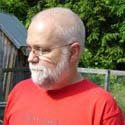The ordering is neither natural nor mental. Important. This afternoon I was sitting in my office waiting for a phone call. I picked up the Investigations & opened to remark 20, which I had looked at last week, but only superficially. Perhaps because I approached the text so casually, I was caught off-guard. The idea that a word can be a sentence & a sentence be a word just about knocked me off my chair. One of the interesting things about Vietnamese (my perpetual exemplar) is that each syllable is spelled separately, i.e., with space around it & while most words consist of a single syllable, a significant number consist of two syllables. To someone like me, just learning the language, these compound words present a real problem: In one context the same pair of syllables can be read as two words, while in another context it is obvious to a native speaker that a single word is being spoken. Historical linguistics could probably explain this phenomena, but native speakers "just know" when two syllables should be read or heard as one word & conversely when each syllable should be heard as a single word. If there is a rule, no one has been able to explain it to me. It seems to me that 19 & 20 are important steps in undercutting the prevailing positivistic view of language promoted by, say, Stephen Pinker. Extending this line of thought in a different direction, I would suggest that W's formulation of the language game as a descriptive apparatus presents an almost insurmountable hurdle to those in the Artificial Intelligence community who believe that 1) language can be described as a unity & 2) reproduced mechanically.
This may be too much of a tangent, but in my recent work on & with hypertext theory & practice, I have run across the assertion that a book is independent of any particular instansiation in material form. That is, a given book is a sort of platonic Idea. I am very suspicious of this notion, even though I can see that it is superficially true. I have a body--doesn't a book have a body? I would be a different person if I were six feet tall or female; why, then, doesn't the body of a book affect its personalit? Or am I making a category mistake here, imagining that books & persons can be thought of as somehow similar?
Philosophical Investigations
Christopher Robinson & Joseph Duemer read Wittgenstein's Philosophical Investigations


0 Comments:
Post a Comment
<< Home